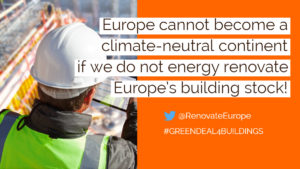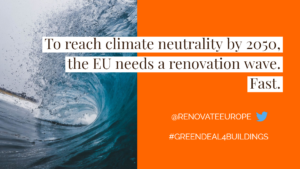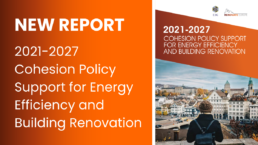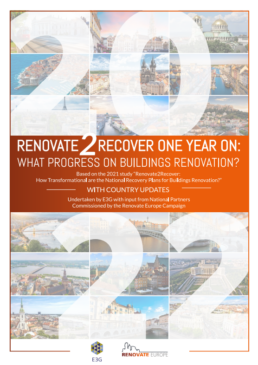2021-2027 Cohesion Policy Support for Energy Efficiency and Building Renovation
This study looks into how EU member states plan to use cohesion policy funding to support renovation and draws attention to key actions to maximise impact.
Renovate2Recover One Year On: What progress on building renovation?
In 2021, the Renovate2Recover study found that amongst the 18 Member States’ NRRPs analysed, €39.9bn was allocated buildings renovation (about 8% of total). This brief provides an update on progress after one year of implementation, and looks at the work which has begun to unlock buildings-related investment worth at least €28bn.
Briefings - Speeding Up the Delivery for Renovation
The Renovate Europe Campaign alongside E3G and the support of our national partners publishes two briefings on “Speeding Up the Delivery for Renovation”. One on “Investing in Skills” and a second on “Investing and Advisory Services and One-Stop-Shops”.
REPowerEU: REC proposes immediate actions on energy renovation
The EU must rapidly reduce its dependence on Russian fossil fuels, and Europe’s leaky buildings are in the spotlight. With buildings accounting for the largest share of final energy consumption, at a high of 40% of energy demand, reducing the energy demand of the building stock in the EU has never been so important.
In this context, last March 8, the European Commission made public its communication “REPowerEU: Joint European action for more affordable, secure and sustainable energy”.
So far, the communication misses the potential for energy savings in buildings. Demand-side measures are highly undervalued in favour of short-term supply driven actions which will lead to stranded assets and damage the overall EU Green Deal and Fit-for-55 ambition. This gap must be rectified by proposing concrete bold measures to stop energy waste in buildings in the REPowerEU Action Plan to be published in May.
For such reason the REC office has prepared a briefing the various opportunities that renovation offers to protect energy poor households and deliver real change to people’s lives by reducing energy demand and therefore citizen’s energy bills, while also keeping an eye on the longer-term objectives of lowering GHG emissions in line with EU Green Deal and climate neutrality goals.
More specifically we have come up with a set of immediate actions to stop energy waste in buildings needed for the REPowerEU Action Plan to be published in May:
- 1. Make Energy Efficiency an energy security priority
- Establish a Delivery Taskforce for Energy Savings
- Increase the ambition and fast-track key measures from the Fit-for-55 legislative package
- 2. Help Member States go faster and further on energy renovation with EU-level financial and technical support:
- Launch an Energy Savings Facility to accelerate MFF investment in renovation
- Front-load and maximise RRF investments on energy renovation to their full potential
- Open a specific DG REFORM Technical Support Call for energy renovation
- Ensure the new EU Fiscal Framework supports energy renovation
- Facilitate private sector mobilisation via higher Taxonomy Requirements for buildings
- 3. Ensure concerted action on Capacity & Delivery by launching an EU-level ‘Renovation Sector Compact’
- Map existing and potential capacity to address bottlenecks in the renovation market, workforce, and supply chains
- Help to modernise the construction sector and upskill its workforce by coordinating a 2022 Renovation Summer School
Read our full briefing here.
Briefing 3/2020: Financing Deep Energy Renovation: The Roles Of Policy Action, Public-Private Partnerships And Financial Tools For Private Dwellings
As part of the final month of the #GreenDeal4Buildings campaign, Renovate Europe has produced two complementary briefings looking at the issue of financing deep energy renovation. While this briefing focuses on the need for strong policy, the potential of public-private partnerships, and the particular challenges of financing renovation in the residential sector, a complementary briefing examines ways to leverage funds through the Just Transition Mechanism and carbon revenues.
Within the EU context and existing 2030 energy savings targets, Renovate Europe notes an annual investment gap of €130-200bn. Some 80% of the investment is needed on the demand side, of which 71% must be directed to the residential sector, which is noted as being particularly challenging because the need for both action and financing is extremely granular.
Over the longer term – i.e. to 2050 – boosting the energy renovation rate to 3% annually would achieve the ambitious goal of reducing energy demand in buildings by 80% while drastically cutting carbon dioxide (CO2) emissions. In turn, this would cut total EU energy demand by 30%, reduce energy bills for all consumers, enhance productivity and increase property value and rentals. Such benefits could boost GDP by 0.7% annually; in 2020 alone, that would equal €39bn in additional public finances.
Renovate Europe calls upon EU institutions to ensure that the European Green Deal creates the ecosystem for deep energy renovation, including establishing stability that will eliminate the current ‘stop-go’ dynamic that erodes investor confidence. This includes making energy efficiency a top priority and planning beyond short-term measures.
You can read the briefing in full here.

Briefing 2/2020: Financing Deep Energy Renovation: Leveraging The Just Transition Mechanism And Carbon Revenues
As part of the final month of the #GreenDeal4Buildings campaign, Renovate Europe has produced two complementary briefings looking at the issue of financing deep energy renovation. This briefing focuses on leveraging funds through the Just Transition Mechanism and carbon revenues, and a complementary briefing examines the need for strong policy, the potential of public-private partnerships, and the particular challenges of financing renovation in the residential sector.
Calculating the actual cost of renovating 97% of the existing building stock in the EU is no easy task. Various methodologies have been applied, each being met with both applause and critiques. Generally, a realistic number seems to be in excess of €300bn per year for the next 30 years. To drive that number home, it’s helpful to think of this way: ~€1 bn per day, every day until 2050.
While that is a lot, it is worth noting that the International Energy Agency estimates that aggressively implementing energy efficiency on a global scale could – by slashing energy bills, reducing energy imports and alleviating energy poverty – deliver benefits of €500bn per year.
Within the EU context and existing 2030 energy savings targets, Renovate Europe notes an annual investment gap of €130-200bn. Some 80% of the investment is needed on the demand side, of which 71% must be directed to the residential sector. Over the longer-term – i.e. to 2050 – boosting the energy renovation rate to 3% annually would achieve the ambitious goal of reducing energy demand in buildings by 80% while drastically cutting carbon dioxide (CO2) emissions. In turn, this would cut total EU energy demand by 30%, reduce energy bills for all consumers, enhance productivity and increase property value and rentals. Such benefits could boost GDP by 0.7% annually; in 2020 alone, that would equal €39bn in additional public finances.
Renovate Europe calls upon EU institutions to ensure that the European Green Deal creates the ecosystem for deep energy renovation, including establishing stability that will eliminate the current ‘stop-go’ dynamic that erodes investor confidence. This includes making energy efficiency a top priority and planning beyond short-term measures.
You can read the full briefing here.







